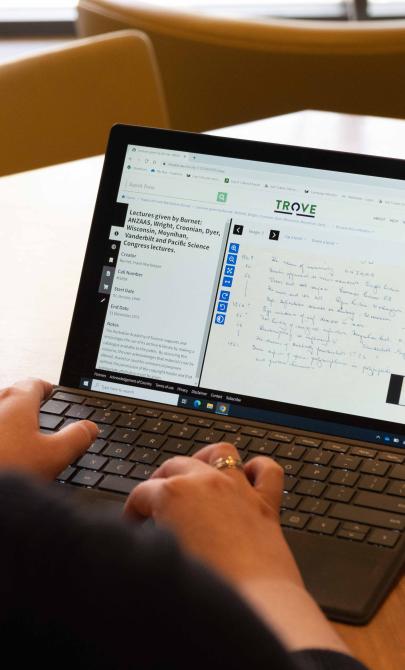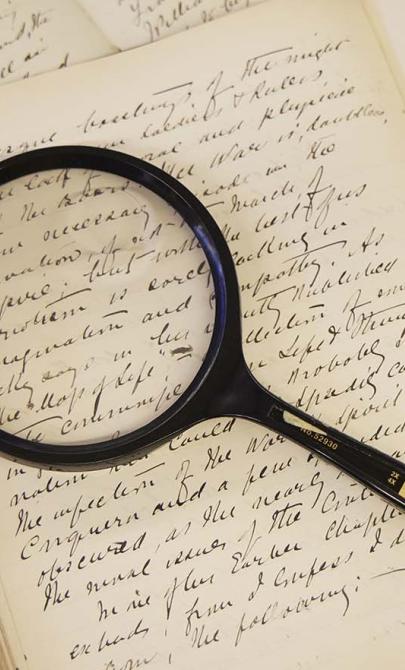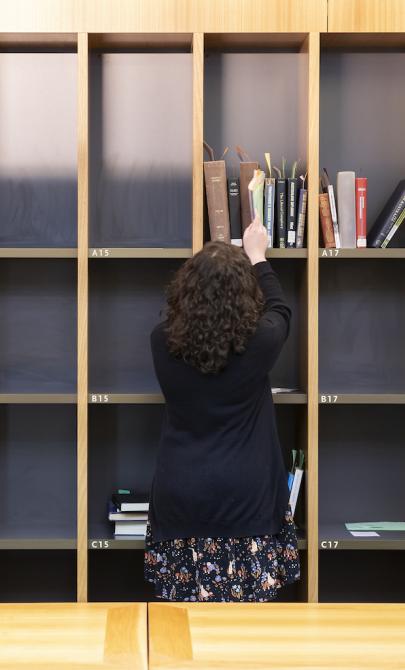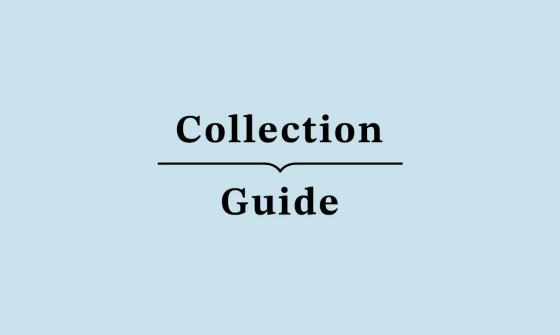Stead Collection
Key items in the collection
Highlights from this collection demonstrate its historical significance and variety.
Papers of Christina Stead
The papers of Christina Stead include:
- manuscripts
- typescripts
- notes and jottings
- correspondence
- diaries
- personal documents
- financial papers
- newspaper cuttings
- photographs
- publications.
There are no surviving manuscripts of her early novels, but the collection contains notes and fragments of drafts of:
- For love alone
- The man who loved children
- House of all nations
- The beauties and furies.
There are more substantial typescripts of:
- Cotters' England
- The little hotel
- Miss Herbert
- I'm dying laughing.
There are a large number of unfinished writings, stories and fragments. A manuscript of William Blake entitled Imperialism – the last phase (1948) is also held.
The diaries date from 1929–1940, 1950–1951 and 1959–1960 and there are also appointment diaries kept in Stead's later years.
The most extensive correspondence is with:
- her husband William Blake (1929–1968)
- her brother David Stead (1929–1983)
- her American and English friends Ettore and Jessie Rella (1944–1982)
- Harry Bloom (1949–1974)
- Philip and Leah Harvey (1958–1983)
- Norman Rosten (1967–1982)
- Stanley Burnshaw (photocopies, 1937–1982).
There are also letters from many Australian writers, mostly dating from the last 10 years of her life.
Letters of Stead
The Library holds a large number of collections containing letters of Stead. They include letters to family members, school friends, personal friends, literary agents and publishers in Britain and the United States, in a few cases dating back to her departure from Australia in 1928. The letters to Australian writers and other Australian friends and acquaintances mostly date from 1969–1983.
- Papers of HC Coombs, public servant
- Papers of Judah Waten, novelist
- Papers of Dal Stivens, novelist and short story writer
- Papers of Rosemary Dobson, poet
- Papers of Dorothy Green, literary historian and critic
- Papers of AD Hope, poet and critic
- Papers of David Martin, novelist and poet
- Papers of Brian Kiernan, literary historian and critic
- Papers of Jack Lindsay, novelist, poet, critic and historian
- Letters of Stead to Ettore Rella, American dramatist and poet (photocopies)
- Papers of AT Bolton, publisher and photographer
- Letters of Stead to Kathleen Grieves, a school friend
- Papers of Manning Clark, historian
- Papers of WH Pearson, historian
- Letters of Stead to Nellie Molyneux, a school friend
- Letters of Stead to Donald Cameron, publisher
- Papers of RF Brissenden, poet, novelist and critic
- Papers of Elizabeth Harrower, novelist
- Letters of Stead to her step-mother Thistle Stead
- Papers of the publisher Oliver Stallybrass and Gunvor Stallybrass, including manuscripts of Stead
- Letters of Stead to her niece Margaret Hanks
- Correspondence of Stead with Laurence Pollinger Ltd, literary agents
- Papers of Gwen Walker-Smith, cousin of Stead
- Papers of Ron Geering, literary executor of Stead
- Letters of Stead to Edith Anderson, American-born writer
- Papers of Dymphna Clark, historian
- Correspondence of Stead with a friend, Harry Bloom
- Letters from Stead to Michael Wilding, author and publisher
- Letters from Stead to Jim Hamilton
- Letters from Stead to her brother Gilbert Stead
- Letters from Christina Stead to Rosemary Hibbert
- Letters of Stead to Gilbert Stead and his wife Betty Stead
- Letters from Stead to her agents Cyrilly Abels and Joan Davies
- Letters from Stead to Pauline Nestor.
Papers of biographers
The Library holds the papers of Christine Williams, the author of Christina Stead: a life of letters (1989). They include:
- a typescript
- galley proofs
- lists of sources and captions
- photographs
- correspondence with the publishers McPhee Gribble and Virago.
In addition, there is an extensive correspondence with friends and acquaintances of Stead (1986–1989) and correspondence with archives and security organisations in the United States.
The Library also holds the papers of Hazel Rowley, accumulated when she was writing Christina Stead: a biography (1993). They also include:
- typescripts of the book and correspondence with friends of Stead (1986–1993)
- transcripts of interviews
- copies of reviews and obituaries
- copies of a large number of letters of Stead held in Britain, America and Australia (1933–1983) in:
- libraries
- archives
- private ownership.
The Library holds an oral history interview with Christina Stead recorded by Hazel de Berg in September 1969.
In addition, there are 26 cassettes of interviews recorded in England, France and Australia by Christine Williams when she was writing Christina Stead: a life of letters. The interviewees include:
- Sir Hermann Black
- Manning Clark
- Rosemary Dobson
- Ralph Elliott
- Margaret Fink
- Ruth Hall
- Elizabeth Harrower
- Leah and Philip Harvey
- Stephen Murray-Smith
- Elizabeth Riddell
- David Stead
- Thistle Stead.
Correspondence of Christina Stead
- Dearest Munx: the letters of Christina Stead and William J Blake, edited by Margaret Harris, 2005
- Christina Stead, Talking into the typewriter: selected letters, 1973–1983, edited by RG Geering, 1992
- Christina Stead, A web of friendship: selected letters, 1928–1973, edited by RG Geering, 1992
Biographical and critical studies
- Michael Ackland, Christina Stead and the socialist heritage, 2016
- Mathilda Adie, Female quest in Christina Stead's For love alone, 2002
- Diana Lynn Allen, Lives of obscure women: polyphonic structures and the presentation of women in the fiction of Christina Stead, PhD thesis, Murdoch University, 1989 [MS 8024]
- Ann Blake, Christina Stead's politics of place, 1999
- Denise Brown, Wakers and sleepers: the dynamics of Christina Stead's 'drama of the person', PhD thesis, University of Tasmania, 1990 [mc G 6596]
- Diana Brydon, Christina Stead, 1987
- Ludmilla Forsyth, Fantasy and dream in Stead's fiction: an examination of Christina Stead's Seven poor men of Sydney, The beauty and furies, and House of all nations, PhD thesis, La Trobe University, 1984 [mc G 6618]
- Judith Kegan Gardiner, Rhys, Stead, Lessing, and the politics of empathy, 1989
- RG Geering, Christina Stead, 1969 [Revised edition 1979]
- Jennifer Gribble, Christina Stead, 1994
- Jennifer Harris (editor), The magic phase; critical essays on Christina Stead, 2000
- Bruce Holmes, Moral dialectic in the fiction of Christina Stead, PhD thesis, University of Newcastle, 1984 [MSD 106]
- Joan Lidoff, Christina Stead, 1982
- Anne Pender, Christina Stead: satirist, 2002
- Teresa Petersen, The enigmatic Christina Stead: a provocative re-reading, 2001
- Hazel Rowley, Christina Stead: a biography, 1993
- Anita Kristina Segerberg, Christina Stead: the American years, PhD thesis, University of Auckland, 1990 [mc 252 91 20208]
- Susan Sheridan, Christina Stead, 1988
- Kate Macomber Stern, Christina Stead's heroine: the changing sense of decorum, 1989
- Michael Wilding, The radical tradition: Lawson, Furphy, Stead, 1993
- Chris Williams, Christina Stead: a life of letters, 1989
- Louise Yelin, From the margins of empire: Christina Stead, Doris Lessing, Nadine Gordimer, 1998
About Christina Stead
Christina Ellen Stead (1902–1983), the daughter of the leading Australian naturalist David Stead, was born in Sydney. She was educated at Bexley Public School, Sydney Girls' High School and Sydney Teachers' College.
A varied career and locations
Stead worked as a teacher and then as an office worker before going overseas in 1928.
In London, where she lived in straitened circumstances, she wrote her first novel Seven poor men of Sydney. She also met William Blech (Blake) (1894–1968), an American writer, banker, economist and Marxist.
They settled in Paris in 1929, where Stead worked as a translator and as secretary in a bank.
In 1937 Stead and Blake moved to the United States. They were active members of the Communist Party. They mostly lived in New York, but also in Santa Fe and Hollywood, where Stead worked as a scriptwriter.
In 1947 Stead and Blake returned to Europe and led an itinerant life in France, Belgium, Switzerland and Italy. They were married in 1952, after Blake was finally granted a divorce by his first wife.
Settling in England
In 1953 they settled in England, first in London and then in a cottage on the Foxwarren Estate in Surrey. William Blake died in 1968.
After becoming a widow, in 1969 Stead visited Australia for the first time in 40 years and took up a fellowship at the Australian National University. On her return to England she lived in Surbiton, Surrey.
Permanent return to Australia
In 1974 Stead returned to Australia permanently and, in the same year, was the first recipient of the Patrick White Award. For further information about Patrick White, visit the White Collection.
Her last years were mostly spent in Sydney – she also lived in Canberra and Melbourne.
Author
Among the novels written by Stead were:
- Seven poor men of Sydney (1934)
- The Salzburg tales (1934)
- House of all nations (1938)
- The man who loved children (1940)
- For love alone (1944)
- A little tea, a little chat (1948)
- Cotters' England (1966)
- The puzzle-headed girl (1967) – 4 novellas
- Ocean of story (1985) – a volume of short stories that appeared posthumously.
Christina Stead has never been a popular writer, but she is often linked with Patrick White as one of the outstanding writers in English in the mid-20th century.
... in their novels, both Stead and White 'move beyond the representational faith of realism, or the seeking of individual difference of modernism, to present a great sweep of disbelief and despair'.
Background to the collection
Christina Stead donated her 1959–1960 diary to the Library in 1975. She bequeathed her manuscripts and papers and they were received from her literary executors, Ron Geering and later Margaret Harris, in a number of instalments between 1984 and 1999. Geering also assisted the Library to obtain letters and other papers from friends of Stead in Britain and the United States.
Edith Anderson bequeathed to the Library a long series of letters from Stead and they were received in 2000.
The correspondence of Harry Bloom with William Blake and Christina Stead was acquired in 2007. A notebook and letter of Stead were purchased in 2007 from Gilbert Stead, the nephew of Christina Stead.
The papers and tape recordings that Christine Williams assembled while working on her life of Stead were purchased in 1990.
The papers of Hazel Rowley relating to her biography of Stead were purchased in 1996.
In the Manuscripts Collection, are:
- Papers of Christina Stead
- Correspondence and other papers formerly in the possession of David Stead
- Papers of Christine Williams
- Papers of Hazel Rowley.
The Williams Collection, which is restricted, occupies 6 boxes and there is a 9-page finding aid
The Rowley Collection occupies 10 boxes and there is an 8-page finding aid.
Held in the Oral History Collection is the oral history interview with Stead recorded by Hazel de Berg with a 14-page transcript.
Also held in the Oral History Collection with restricted access are the 26 interviews recorded by Christine Williams.
The extensive correspondence of Stead with Stanley Burnshaw, the American poet, critic and editor of the journal New Masses, is held in the Harry Ransom Research Center in the University of Texas at Austin.
This guide was prepared using these references:
- Stephen Holt, A Steadfast Revenge: Dr Duncan and Mr Crow, National Library of Australia News, vol 13 (11), August 2003, pp 7–10
- Anne Pender, In search of Christina Stead, National Library of Australia News, vol 11 (6), March 2001, pp 11–13
- Graeme Powell, 'National News' [the Stead Papers], Australian Book Review, no 242, June/July 2002, p 48
- William H Wilde, Joy Hooton, and Barry Andrews, 'Christina Stead' in Oxford companion to Australian literature, Melbourne, Oxford University Press, 1994, pp 714–15




